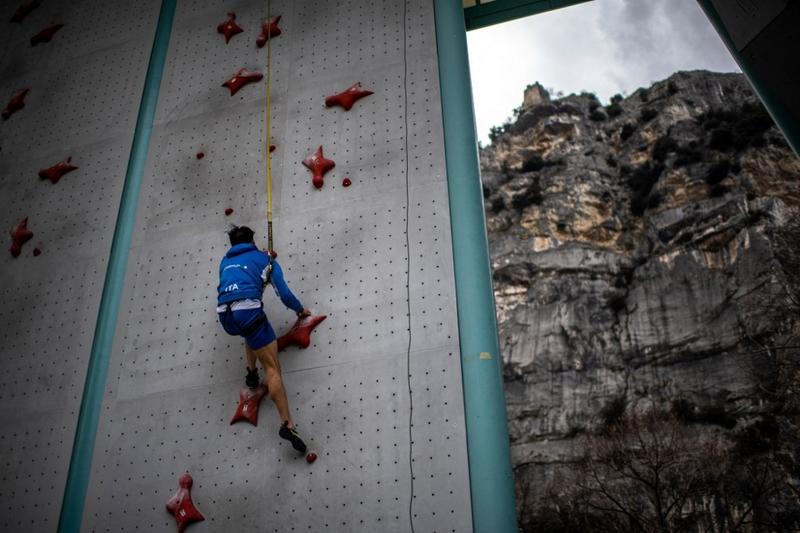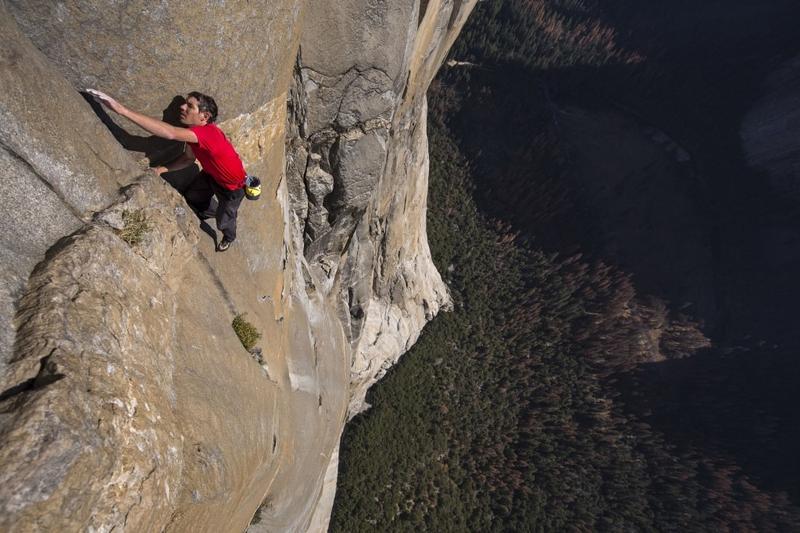 A member of the Italian national climbing team climbs on the artificial wall at the Rock Masters Climbing Stadium in Arco, near Trento, Alps Region, north-eastern Italy, on March 6, 2021. (MARCO BERTORELLO / AFP)
A member of the Italian national climbing team climbs on the artificial wall at the Rock Masters Climbing Stadium in Arco, near Trento, Alps Region, north-eastern Italy, on March 6, 2021. (MARCO BERTORELLO / AFP)
The Olympics could take climbing to new heights says Alex Honnold who might have had winning a gold medal as his goal growing up instead of an historic free solo climb up El Capitan if the sport had been part of the Summer Games.
Honnold’s heart-stopping ascent of Yosemite’s 3,200-foot sheer granite slab in 2017 turned into an Oscar-winning documentary and was a watershed moment for the sport.
The film called Free Solo brought the high-definition terror into living rooms around the world, leaving viewers instinctively clutching at arm rests as Honnold, without a rope or safety gear, hung by his finger tips on a rock wall.
ALSO READ: High fives, smiles but no cheers as Olympic torch relay gets going
Out in nature a slip-up might result in death, but in a Tokyo arena where climbing will make its debut at the Tokyo Games this year it could mean the loss of a medal.
Even without that primal element the Olympic stage is set, says Honnold, to provide the next big push for climbing.
Realistically I am too old. It’s not really a possibility for me but if I were a 10-year-old again getting into climbing for the first time it probably would be a big inspiration.
Alex Honnold, rock climber and Academy Award winner
“Realistically I am too old,” the 35-year-old told Reuters about a missed Olympic opportunity. “It’s not really a possibility for me but if I were a 10-year-old again getting into climbing for the first time it probably would be a big inspiration.
“Honestly I am just looking forward to seeing the event because I just think climbing in the Olympics is such an historic moment for the sport and to be able to watch the competitors in real life and watch the greatness.
“I mean the people competing in the Olympics are the best climbers of this generation it is going to be incredible to watch.”
‘Climbing Gold’
While Honnold will not be competing he is clearly captivated by the idea of sport climbing being in the Summer Games.
He will be in Tokyo as a commentator and on Friday launched a podcast called “Climbing Gold” that will track the rise of the sport from the early days as the domain of a lunatic fringe through its growth as an industry, culminating with the Olympics.
Sport climbing is among the latest tranche of trending sports to get a spot on the Olympic roster as the International Olympic Committee tries to stay current by tempting a younger audience to tune in.
 his handout photo obtained Oct 3, 2018 courtesy of National Geographic/Jimmy Chin shows Alex Honnold free solo climbing on El Capitan's Freerider in Yosemite National Park, becoming the first person to climb El Capitan without a rope. (JIMMY CHIN / NATIONAL GEOGRAPHIC / AFP)
his handout photo obtained Oct 3, 2018 courtesy of National Geographic/Jimmy Chin shows Alex Honnold free solo climbing on El Capitan's Freerider in Yosemite National Park, becoming the first person to climb El Capitan without a rope. (JIMMY CHIN / NATIONAL GEOGRAPHIC / AFP)
Snowboard, ski cross and Big Air, once the property of the X Games, are now also part of the Olympic stable. This summer in Tokyo skateboarding, surfing and sport climbing join the club.
At the 2024 Paris Summer Games breakdancing will be added to the Olympic playlist.
For sports operating just outside the mainstream, the Olympic tide is one that lifts all sports and provides massive global exposure.
But not everyone who practices these sports views the Olympic stamp of approval as a good thing.
Hardcore base
Born in the back country or the hard-scrabble urban streets, each of these sports has a hardcore base that sees partnering with the Olympics as betrayal - a sell-out that trades freedom and creativity for regulations and medals.
Honnold says he understands the dilemma but for him the Olympics are another way to grow climbing by pushing boundaries and challenging the status quo.
“I can see both sides for sure but I come down harder on the good for the sport side,” he said. “I’m a professional climber, I make a living because the climbing world has been growing.
“It is going to be really interesting with climbing in the Olympics because that does feel like a huge spotlight on the sport.”
Until the Olympics the enigmatic Honnold has been the bridge between the tight-knit climbing community and the wider public, whose recent fascination with the sport has had as much to do with the man as the mountain.
Nicknamed “No Big Deal” for his relaxed demeanour, the wiry Honnold is engaging and likeable but wired differently - literally.
Studies on Honnold have shown that his amygdala, the part of his brain that senses danger and would leave most paralysed with fear hanging from a cliff, is nearly impossible to stimulate.
READ MORE: Report: Japan may grant entry to foreign volunteers for Olympics
Those qualities and abilities have combined to make Honnold climbing’s most intriguing figure and the face of an emerging sport.
“It was never really my personal plan (to be the face of climbing) but if that is what I fall into I am happy for it,” he said. “Realistically I want to go climb as much as possible. I love to go climbing.
“My climbing experience is better if there are other climbers. I do often seek out new routes in far flung climbing areas but in general the bigger the climbing community the better it is for me so I am all for it as an Olympic sport.”


